Plenty of people look toward retirement and think about all that extra time to—let’s just say—spend with the grand kids, take a long-desired vacation, or learn a new hobby. But as Patricia “Pat” Provnick of New Jersey puts it, “I wasn’t retired 15 minutes before I was called to help.” And that’s not unusual. Meet six NEA-Retired members who got their second wind and jumped back into Association work to protect public school students, active and retired educators, and the teaching profession. Years into retirement, they continue to make a difference.
Barbara Matteson
Elementary School Teacher, Tucson, Arizona
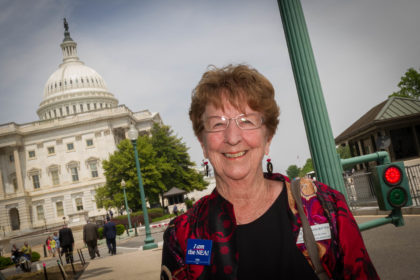 You could easily describe Barbara Matteson, a former elementary school teacher from Arizona, as outdoorsy. Most days, she hikes four miles on one of Tucson’s trails as early as 5a.m.—just to beat the heat. If she’s not out on the trail, then she’s out knocking on doors for issues that are important to her, such as women’s rights, political candidates, and education.
You could easily describe Barbara Matteson, a former elementary school teacher from Arizona, as outdoorsy. Most days, she hikes four miles on one of Tucson’s trails as early as 5a.m.—just to beat the heat. If she’s not out on the trail, then she’s out knocking on doors for issues that are important to her, such as women’s rights, political candidates, and education.
“I try to keep busy,” says Matteson, who was recognized in June as the NEA-Retired 2017 winner of the Distinguished Service Award. The recognition, presented annually since 2000, is the organization’s highest honor.
The award is a fitting tribute. For the past 27 years, Matteson has been a member of the Arizona Women’s Political Caucus, an affiliate of the National Women’s Political Caucus, a multipartisan, grassroots organization that increases the number of pro-choice women in elected and appointed positions. In this role, Matteson encourages and supports women running for elected office by targeting, recruiting, and training those who are interested in the political process.
“I support these candidates, attend panels when they’re speaking, and work on their campaigns,” she says of her work as a political activist. The work dovetails with her her commitment to education.
Matteson, who once served as the president and vice president of NEA-Retired, and was on the NEA-Retired Executive Committee, is now involved with an initiative to rescind a voucher law, signed in April by Arizona Gov. Doug Ducey, It’s the largest voucher expansion program the state—and the nation—has ever seen. The program gives vouchers to students to use for private and religious school tuition, as well as homeschooling. “This is a terrible thing for public education,” says Matteson—which is why she’s often outdoors, walking on a political trail to get pro-public education friendly candidates elected and bad laws overturned.
Deloris Rome Hudson
Family and Consumer Science Teacher, Hamilton, Ohio
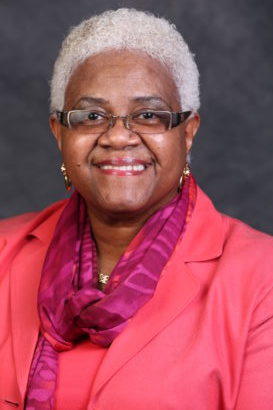 As Deloris Rome Hudson neared retirement, she found herself reflecting upon the students she had taught throughout the years—especially the one or two students she had removed from her classroom for disruptive behavior. She would ask herself the tough questions: Was she too impatient with them? Were the kids just being kids? What would happen to them once they left her classroom?
As Deloris Rome Hudson neared retirement, she found herself reflecting upon the students she had taught throughout the years—especially the one or two students she had removed from her classroom for disruptive behavior. She would ask herself the tough questions: Was she too impatient with them? Were the kids just being kids? What would happen to them once they left her classroom?
“I found out the students who were misbehaving in my class were also misbehaving in other classes—and they were subsequently being kicked out of school,” says Hudson, who would also learn that one or two of her former students had spent time in jail. This didn’t sit well with her. She decided to do something about it.
“I wanted to help students stay in school and become productive citizens, not end up in jail.” In 2011—in the midst of her 37th year of teaching—Hudson began to explore different opportunities. A year later, she became involved with NEA’s work to bring attention to the school to-prison pipeline—policies and practices that can push students out of public schools and into the juvenile and criminal justice systems. These practices include zero-tolerance discipline, increased police presence in classrooms and hallways, insufficient services and support, and rising class sizes.
Hudson is a facilitator for NEA edCommunities’ School-to-Prison Pipeline. Since 2013 she has worked to get the issue the attention it deserves. She engages with active members nationwide, and more recently her home state of Ohio, about school discipline policies. Hudson has heard stories of students being sent home for their attire or for wearing braided hair extensions. She has heard of students being suspended for not answering a question or for rolling their eyes. “We want to reduce, prevent, and develop good relationships between educators and students,” says Hudson. Part of that, she adds, is “making sure you have training in restorative justice practices, which help promote good discipline in your school and helps to get school boards to change restrictive policies.”
Patricia “Pat” Provnick
Primary School Teacher, Camden, New Jersey
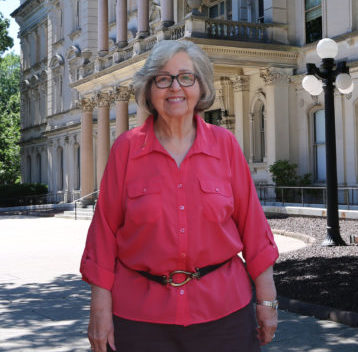 In 2013, Pat Provnick, a retired Kindergarten teacher for the Winslow Township School District, was a delegate for the New Jersey Education Association (NJEA) Delegate Assembly in Trenton, N.J. She had found herself sitting in the hotel lobby next to the government relations director of the NJEA, Ginger Gold Schnitzer, and recalls turning to her and saying, “You know, there are more ways to work collegially with retirees to better serve the needs of government relations.” From there, an idea was born.
In 2013, Pat Provnick, a retired Kindergarten teacher for the Winslow Township School District, was a delegate for the New Jersey Education Association (NJEA) Delegate Assembly in Trenton, N.J. She had found herself sitting in the hotel lobby next to the government relations director of the NJEA, Ginger Gold Schnitzer, and recalls turning to her and saying, “You know, there are more ways to work collegially with retirees to better serve the needs of government relations.” From there, an idea was born.
The New Jersey Retired Education Association (NJREA) soon became the “daytime face” of NJEA for many events and activities. “We go to state board of education meetings, legislative sessions, or visit elected leaders,” says Provnick, who taught primary grades for 33 years before she retired in 2000. Initially a social organization, the NJREA was adding more advocacy work to its structure, and leadership called on Provnick to help change its constitution. “I wasn’t retired 15 minutes before I was called to help,” says Provnick.
Members who volunteer are briefed on the issues and trained to lobby, from what to wear to where to go. “We even show them where lobbyists like to hide,” Provnick says laughingly.
Advocacy is a growing movement among NJREA. When the group first hosted a Lobby Day 85 people showed up. The following year, more than 200 people lobbied state elected officials. It’s a critical movement, too. In New Jersey, state pensions are at risk of collapse. Health benefits have suffered massive cuts. Teachers and their unions have been vilified.
“I hate to see people abused and misled,” says Provnick. When people were hired, money was taken out of their paycheck for their retirement, but the state didn’t meet their responsibility. Now we have people who are in jeopardy of substantial reductions to their benefits. That’s an injustice.”
Jon-Paul Roden
Computer Science Teacher, Vernon, Connecticut
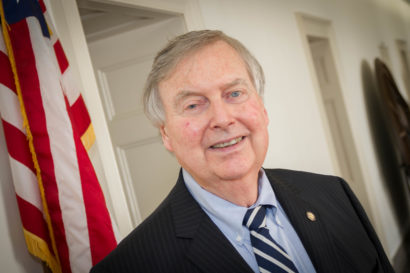 When Jon-Paul Roden started teaching in 1965, he needed to take on a second job to help supplement his income. This side job, along with others, made him eligible for Social Security benefits when he retired in 2000. His colleagues who didn’t take outside work and had only teaching pensions were left without a Social Security benefit, and most importantly, the Medicare Part B coverage.
When Jon-Paul Roden started teaching in 1965, he needed to take on a second job to help supplement his income. This side job, along with others, made him eligible for Social Security benefits when he retired in 2000. His colleagues who didn’t take outside work and had only teaching pensions were left without a Social Security benefit, and most importantly, the Medicare Part B coverage.
Connecticut is one of 15 states where some public employees (teachers, police, nurses, and firefighters) don’t pay into Social Security— unless they worked a second job. A 34-year old federal law, however, reduces the Social Security benefit for retired and disabled workers receiving government pensions.
“I knew about it in advance. I didn’t like it, but I knew about it,” says the retired Vernon Public Schools computer science teacher. The “it” refers to the Windfall Elimination Provision (WEP), which reduces a person’s Social Security benefit by up to 50 percent if they also receive a government pension. Throw into this mix the Government Pension Offset (GPO), which reduces—by two-thirds—the Social Security spousal or survivor benefits of people not covered by Social Security themselves, and “it changes a person’s lifestyle because they don’t have the income they were expecting or were entitled to receive,” Roden says.
“It was such a shock to people who didn’t have extra employment to cover Social Security,” recalls Roden. “It affected not just me, but my colleagues, too,” and then, he says, “I got busy.”
He knocked on doors, wrote emails, and made phone calls to get Members of Congress to cosponsor legislation that would fully repeal the WEP and GPO. He’s had some success, too. In the last session of Congress, for the first time that he could remember, Connecticut had every House Representative and its two U.S. Senators co-sign the “Social Security Fairness Act of 2017,” a bill that would fully repeal WEP and GPO.
Recently, Roden was one of more than a dozen NEA-Retired leaders who went to Capitol Hill in Washington, D.C., for National Retirement Security Advocacy Day, where they met and strategized with U.S. Reps. Adam Schiff, D-Calif., and Rodney Davis, R-Ill., and U.S. Sens. Sherrod Brown, D-Ohio, and Claire McCaskill, D-Mo., the lead sponsors of the Social Security Fairness Act of 2017.
Roden encourages other retirees to thank their Members of Congress if they’ve signed on to legislation that fully repeals WEP and GPO. If they haven’t signed on, “I call it a ‘monthly quest’ to email, write, and tell them your story about the negative effects of WEP and GPO.
Linda Somo
High School Counselor, Mesa, Arizona
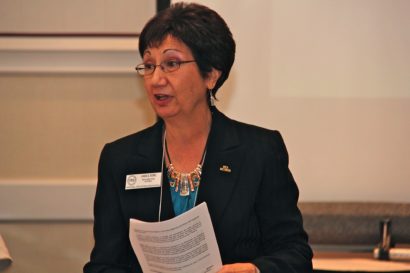 Linda Somo retired in 2000 from the Mesa Public School District, where she spent 30 years as a teacher and counselor. Within that time, Somo was an active member of NEA, the Arizona Education Association (AEA), and the Mesa Education Association. Today, Somo serves as the past president of AEA-Retired and remains on the go through an initiative called the M.O.R.E. (Mobilize, Organize, Recruit, and Energize) project.
Linda Somo retired in 2000 from the Mesa Public School District, where she spent 30 years as a teacher and counselor. Within that time, Somo was an active member of NEA, the Arizona Education Association (AEA), and the Mesa Education Association. Today, Somo serves as the past president of AEA-Retired and remains on the go through an initiative called the M.O.R.E. (Mobilize, Organize, Recruit, and Energize) project.
Established two years ago through an NEA grant, M.O.R.E team members travel throughout Arizona to keep their retired peers—especially those who moved to Arizona from other states—informed on education and retirement issues. The group also mobilizes them to take action and encourage membership to the retired local chapter.
“We have been emphasizing membership,” says Somo, “because our strength is in our numbers— and the more numbers we have, the stronger our voice, and the more legislators will listen.”
In addition to membership, other top priorities include protection of Social Security, Medicare and pensions. Twice a year, the group hosts a meeting that brings in national speakers. Top names include Alex Lawson of Social Security Works, a Washington, D.C.-based organization that works to improve the economic security of disadvantaged and at-risk populations, and Jon “Bowzer” Bauman from the rock n’ roll band Sha Na Na. Bauman is now an advocate for social safety-net programs.
As a member of the M.O.R.E Project and AEARetired, Somo, along with other retired members, monitors Arizona’s state retirement system, attends hearings, and provides testimony for bills coming through the state capitol.
“We keep abreast of all the pending legislation,” says Somo. “This helps our active members, too, because when they’re in the classrooms, retirees are out testifying.”
Celeste Carr Williams
Biology Teacher, Fort Washington, Maryland
 If you ever need a strong advocate to show support for the education profession, count on Celeste Carr Williams of Prince George’s County, Md. Upon retiring in 2008, she volunteered to be a part of NEA’s Rapid Response Team, a group of educators from the Washington, D.C., Metropolitan Area who show up on short notice to a rally or event.
If you ever need a strong advocate to show support for the education profession, count on Celeste Carr Williams of Prince George’s County, Md. Upon retiring in 2008, she volunteered to be a part of NEA’s Rapid Response Team, a group of educators from the Washington, D.C., Metropolitan Area who show up on short notice to a rally or event.
“I’ve attended different rallies on Capitol Hill and I’ve pushed issues and concerns that are important to educators,” says Williams. “These are great opportunities for retirees to lend their voice and expertise, and promote all forms of enhancements for our students.”
Williams’ expertise spans more than 30 years as a science teacher at Friendly High School in Fort Washington, Md. Her commitment to the profession goes beyond the classroom, too. For years, she’s worked with the Maryland State Celeste Carr Williams Education Association (MSEA) on women’s issues and was a member of the Minority Affairs Caucus. Post-retirement she was voted in to the Retired Teachers Advisory Council, a branch of MSEA. Williams’ involvement with these groups has allowed her to stay on top of the latest education policy and news, making her a reliable voice in the field.
“We need to be aware of what’s happening in education,” Williams says, “and we need to protect the profession from harmful policies and practices.”
One way to beat back these policies that weaken the educational system, suggests Williams, is to be informed, engaged, and involved with every level of the Association.
“[These] organizations give us strength, as a body of educators, to know what’s best for our profession and our students, and they offer us the opportunity to be the best.”






